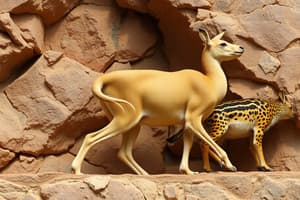Podcast
Questions and Answers
What aspect of geology does the article emphasize the importance of understanding?
What aspect of geology does the article emphasize the importance of understanding?
- The principles of geography and coordinates (correct)
- The study of minerals
- The formation of volcanoes
- The history of earthquakes
Which component is NOT a part of a Geographic Coordinate System (GCS) according to the article?
Which component is NOT a part of a Geographic Coordinate System (GCS) according to the article?
- Geoid
- Ellipsoid
- Gravity Equator (correct)
- Datum
In GIS, what do coordinate systems provide a reference frame for?
In GIS, what do coordinate systems provide a reference frame for?
- Mapping celestial bodies
- Geological dating techniques
- Pinpointing locations on the Earth's surface (correct)
- Determining weather patterns
What shape is used to represent the Earth in an ellipsoid within a Geographic Coordinate System?
What shape is used to represent the Earth in an ellipsoid within a Geographic Coordinate System?
Which system represents a system where gravity pulls equally in every direction?
Which system represents a system where gravity pulls equally in every direction?
What is the primary function of using latitude and longitude to locate places on Earth?
What is the primary function of using latitude and longitude to locate places on Earth?
What is latitude measured in?
What is latitude measured in?
What is longitude measured in?
What is longitude measured in?
What unit do maritime and aviation navigators use to determine distances?
What unit do maritime and aviation navigators use to determine distances?
How many minutes are there in a degree?
How many minutes are there in a degree?
Which unit is equivalent to one nautical mile per hour?
Which unit is equivalent to one nautical mile per hour?
Study Notes
Geology Article: Using Coordinates to Locate Places
Geology is the scientific study of the solid Earth, the rocks of which it is composed, and the processes by which they change over time. Understanding the principles of geography and coordinates is crucial in various aspects of geology, including mapping natural resources, studying plate tectonics, and understanding geological hazards. This article focuses on the geographical subtopic of coordinates, specifically using latitude and longitude to accurately locate places on our planet.
Coordinate Systems in GIS
A coordinate system is inherently linked to any Geographic Information System (GIS) and spatial analysis data, whether it's a simple square grid or something more complicated like a geodetic reference system. GIS coordinate systems range from arbitrary ones, such as a 10-meter grid in a forest woodlot or the boundary of a sports field, to those based on geographic reference systems, like Geographic Coordinate Systems (GCS).
Geographic Coordinate Systems
A Geographic Coordinate System (GCS) provides a reference frame for pinpointing locations on the Earth's surface. The primary components of a GCS include an ellipsoid, a geoid, and a datum. An ellipsoid represents the Earth as an oblate spheroid, accounting for the planet's slight flattening at the poles due to its rotation. The geoid refers to the gravitational equipotential surface, representing a system where gravity pulls equally in every direction. Lastly, the datum serves as a reference point from which vertical displacements of the ellipsoid are computed.
Latitude and Longitude Measurements
In latitude and longitude measurements, degrees, minutes, and seconds represent angles rather than time units. A degree consists of 60 minutes, and a minute is further broken down into 60 seconds. Latitude is measured in degrees north or south of the equator, ranging from 0° to 90°. Longitude is measured in degrees east or west of the prime meridian, extending from 0° to 180°.
Navigation and Cartography
Coordinate systems play a vital role in navigation and cartography. For instance, maritime and aviation navigators use nautical miles, roughly equivalent to one minute of latitude along a line of longitude, to determine distances and calculate directions. Additionally, meteorologists employ knots, equivalent to one nautical mile per hour, to describe wind speeds.
By utilizing these coordinated systems, we can precisely locate features on the Earth's surface, enabling us to better understand and appreciate the vast wonders of geology and our planet as a whole.
Studying That Suits You
Use AI to generate personalized quizzes and flashcards to suit your learning preferences.
Description
Explore the significance of coordinates in geology, including mapping natural resources, understanding plate tectonics, and studying geological hazards. Learn how geographic coordinate systems like latitude and longitude are vital for pinpointing locations on Earth's surface and facilitating navigation and cartography.




